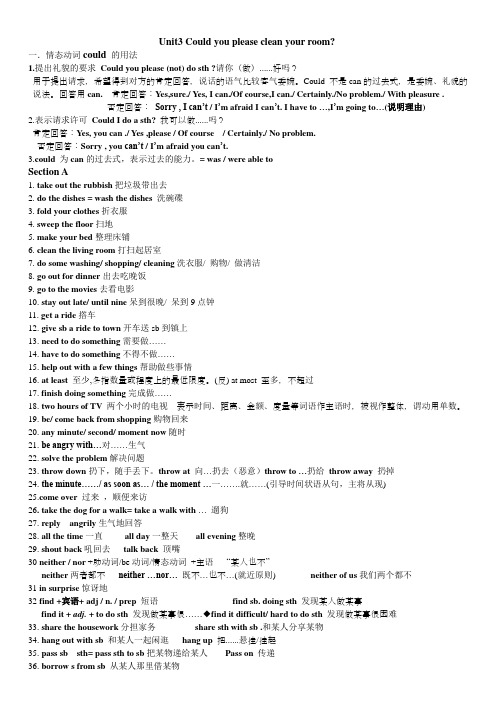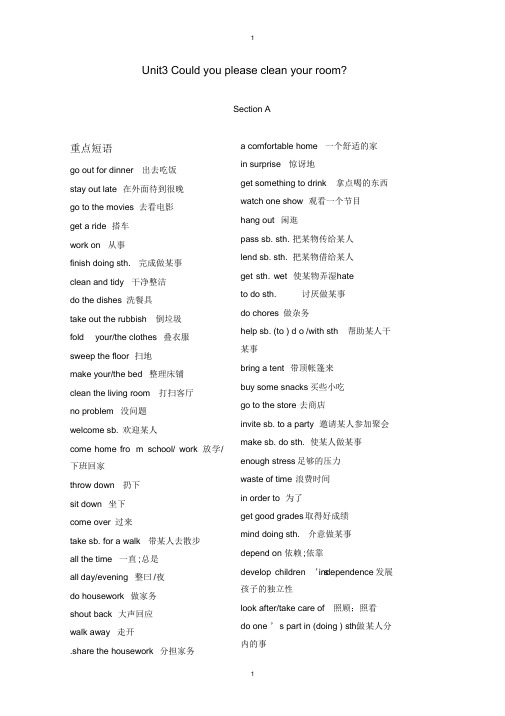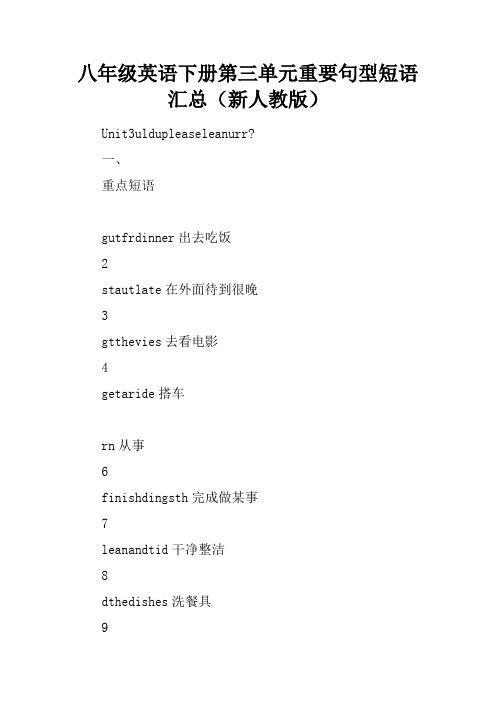新版八年级英语下册第三单元知识点归纳
英语八年级下册第三单元知识点总结

英语八年级下册第三单元知识点总结Unit 3. Could you please clean your room?一、短语动词1、take out 带出去;取出;拔出;除掉动副词组代词作宾语时必须放在两词之间。
2、come over 固定短语过来,顺便来访,拜访。
后面加介词to,后接表示地点的名词作宾语。
拓展:take out of 把---从---取出/带出3、hang →hung→hung hang out 闲逛;溜达。
4、throw down扔下;随手丢下其中throw可用作及物或不及物动词,意为扔,掷→threw→thrown拓展:throw at向----扔去(带有攻击性)throw to 扔给---(不含恶意)throw away扔掉SectionB1、take care of 照顾;照料。
相当于look after后可接名词、(反身)代词作宾语。
Take good care of相当于look after well2、二、动词用法1、finish 及物动词完成后跟名词、代词或动词ing形式作宾语。
拓展:与finish一样用法的动词或动词短语有:enjoy/look forward to/mind/have fun/practice/be busy/consider/feel like/give up2、pass用作及物动词给;递;pass sb sth =pass sth to sb把某物递给某人。
走过、通过(考试等)作不及物动词,(时间)过去,流逝3、borrow sth from sb向某人借某物。
非延续性动词Lend(lent;lent) sb sth=lend sth to sb借给某人某物。
非延续性动词Keep 由“保存”引申为“借”,延续性动词,可与时间段连用。
四川-----Excuse me,can I_____your pen?-----sorry,I have_____it to Bob.A.borrow;lendB.borrow;borrowedC.lend;borrowedD.lend;lent4、hate及物动词厌恶;讨厌,表示一种感情或心理状态,不能用于进行时态。
最新人教版八年级英语下册第三单元知识点总结

工单位在编制施工组织设计(施工方案)时,根据自身的技术力量和创优工程的经验,将质量目标分解到最基本的分项工程去,并制定出行之有效的的创优计划,监理项目机构严格按照目标分解的要求进行事前、事中、事后控制。
对于应达到优良分项而达不到的,坚决要求施工单位返工,直到达到优良等级。
这样从保证分项优良,到保证分部优良,最后确保单位工程的合格。
8.1.3工程质量控制(实施阶段)的三个阶段
(1)施工准备阶段(事前控制):
掌握和熟悉质量控制的技术依据:审查施工单位配备人力、材料、机械设备是否合理:审查拟订施工方案、技术、质量保证措施、原材料检验的审批等是否合符要求。
(2)施工阶段(事中控制):
检查施工单位施工工艺是否按规范和经审批的方案进行。
(3)验收阶段(事后控制):通过检测和验评该分项或分部已完工程是否达到规范要求的质量标准和误差的允许范围。
8.1.4 实施质量控制所采用的四种手段:
(1)检查:施工过程中对重点项目和部位实施必要的跟踪、检查、检查施工单位是否按批准的方案、技术规范施工。
(2)光缆的接续、测试要进行全过程跟踪旁站,旁站观看各项指标严格按验收标准控制把关。
(3。
新人教版八年级英语下册第三单元知识点

Unit3 Could you please clean your room?一.情态动词could 的用法1.提出礼貌的要求Could you please (not) do sth ?请你(做)......好吗?用于提出请求,希望得到对方的肯定回答,说话的语气比较客气委婉。
Could 不是can的过去式,是委婉、礼貌的说法。
回答用can.肯定回答:Yes,sure./ Yes, I can./Of course,I can./ Certainly./No problem./ With pleasure .否定回答:Sorry , I can’t / I’m afraid I can’t. I have to …,I’m going to…(说明理由)2.表示请求许可Could I do a sth? 我可以做......吗?肯定回答:Yes, you can ./ Yes ,please / Of course / Certainly./ No problem.否定回答:Sorry , you can’t / I’m afraid you can’t.3.could 为can的过去式,表示过去的能力。
= was / were able toSection A1. take out the rubbish把垃圾带出去2. do the dishes = wash the dishes洗碗碟3. fold your clothes折衣服4. sweep the floor扫地5. make your bed整理床铺6. clean the living room打扫起居室7. do some washing/ shopping/ cleaning洗衣服/ 购物/ 做清洁8. go out for dinner出去吃晚饭9. go to the movies去看电影10. stay out late/ until nine呆到很晚/ 呆到9点钟11. get a ride撘车12. give sb a ride to town开车送sb到镇上13. need to do something需要做……14. have to do something不得不做……15. help out with a few things帮助做些事情16. at least至少,多指数量或程度上的最低限度。
八年级英语下册第三单元笔记

八年级英语下册第三单元笔记一、重点单词。
1. rubbish.- n. 垃圾;废弃物。
例如:There is a lot of rubbish on the street.(街道上有很多垃圾。
)2. fold.- v. 折叠;对折。
如:Fold the paper in half.(把纸对折。
)3. sweep.- v. (swept, swept) 扫;打扫。
例如:I sweep the floor every day.(我每天扫地。
)4. floor.- n. 地板;地面。
如:The book is on the floor.(书在地板上。
)5. mess.- n. 杂乱;不整洁。
例如:What a mess!(多么杂乱啊!)6. throw.- v. (threw, thrown) 扔;掷。
例如:Don't throw rubbish everywhere.(不要到处扔垃圾。
)7. neither.- adv. 也不。
用于否定句中,表示前面所说的情况也适用于后者。
例如:He doesn't like apples, neither do I.(他不喜欢苹果,我也不喜欢。
)- pron. 两者都不。
例如:Neither of them is right.(他们两个都不对。
)8. shirt.- n. 衬衫。
如:This is a white shirt.(这是一件白色的衬衫。
)9. pass.- v. 给;递;走过;通过。
例如:Pass me the salt, please.(请递给我盐。
);He passed the exam.(他通过了考试。
)10. borrow.- v. 借;借用。
例如:Can I borrow your pen?(我能借用你的钢笔吗?)11. lend.- v. (lent, lent) 借给;借出。
例如:I can lend you some money.(我可以借给你一些钱。
八年级英语下册Unit3-课文讲解+知识点+练习

Unit3 Could you please clean your room?Section A重点短语go out for dinner 出去吃饭stay out late 在外面待到很晚go to the movies 去看电影get a ride 搭车work on 从事finish doing sth. 完成做某事clean and tidy 干净整洁do the dishes 洗餐具take out the rubbish 倒垃圾fold your/the clothes 叠衣服sweep the floor 扫地make your/the bed 整理床铺clean the living room 打扫客厅no problem 没问题welcome sb. 欢迎某人come home fro m school/ work 放学/ 下班回家throw down 扔下sit down 坐下come over 过来take sb. for a walk 带某人去散步all the time 一直;总是all day/evening 整曰/夜do housework 做家务shout back 大声回应a comfortable home 一个舒适的家in surprise 惊讶地get something to drink 拿点喝的东西watch one show 观看一个节目hang out 闲逛pass sb. sth. 把某物传给某人lend sb. sth. 把某物借给某人get sth. wet 使某物弄湿hateto do sth. 讨厌做某事do chores 做杂务help sb. (to ) d o /with sth 帮助某人干某事bring a tent 带顶帐篷来buy some snacks 买些小吃go to the store 去商店invite sb. to a party 邀请某人参加聚会make sb. do sth. 使某人做某事enough stress 足够的压力waste of time 浪费时间in order to 为了get good grades 取得好成绩mind doing sth. 介意做某事depend on 依赖;依靠develop children ’in s dependence 发展孩子的独立性look after/take care of 照顾;照看walk away 走开.share the housework 分担家务do one ’s part in (doing ) sth做.内的事某人分二、重点句型1. Could you please ..do sth. ? Could you please clean your room? 你能整理一下你的房间吗?2. I have to do some work. 我必须干些活。
八年级英语下册第三单元知识点

八年级英语(Yu)下册第三单元知识点一(Yi)、重点短(Duan)语1.go out for dinner2.stay out late3.go to the movies4.get a ride5.work on sth.6.finish doing sth.7.clean and tidy8.do the dishes9.take out the rubbish10.fold your/the clothes11.sweep the floor12.make your/the bed13.clean the living room14.No problem15.16.17.throw down18.throw away19.(to+地(Di)点)20.take sb. for a walk21.all the time22.all day/evening23.do housework24.shout back 大声(Sheng)回应25.walk away26.share the housework27.28.(do sth.) in surprise 惊讶(Ya)地(做(Zuo)…)29.get something to drink30.watch one show31.hang out32.pass sb. sth.33.lend sb. sth.34.get sth. wet35.hate + (to do/ doing) sth.36.do chores37.help sb.(to)do /with sth38.bring a tent39.buy some snacks40.go to the store41.invite sb. to a party42.make sb. do sth.43.enough stress44.waste of time45.in order to为(Wei)了46.get good grades47.mind doing sth.48.depend on49.develop children 's independence50.look after/take care of51.do one’ s part in (doing ) sth.做某人分(Fen)内的事二(Er)、重点句(Ju)型1. Could you please clean your room? ( Could you please + do sth.?)2. I have to do some work.(Could +主(Zhu)语+ do sth. ?表(Biao)情求)4. She won’ t be happy if she sees t his mess.5. For one week, she did not do any housework and neither did I. (Neither +be动(Dong)词/助动(Dong)词/情态动词+主语.)6. My mom came over as soon as I sat down in front of the TV.7. It’s the parents’ job.(it为形式主语,to do不定式是真正的主语,并且后置)8. I think it’s important for children to learn how to do chores and help their parents with housework.9. The earlier kids learn to be independent, the better it is for their future. (the+比较级…,the+比较级…句型)三、单元考点2.take out带出去;取出,拿出 take the rubbish out take out 100yuan take your tickets out3. make the/ one’s bed整理床铺,make the table收拾桌子,摆放碗筷5. (at) any minute (now)很快,马上Mother will be back any minute now.Hurry up! The train is leaving at any minute.6. mess 【名词】不整洁,杂乱(不堪) be in a mess乱七八糟,杂乱不堪0. reply回答,回复【不及物动词】reply to sb./sth. ,reply to your letter reply in writing13. pass sb. sth.= pass sth. to sb.把某物递给/传给某人,请把盐递给我。
人教版初二英语下册第三单元知识点总结

人教版初二英语下册第三单元知识点总结In the third unit of the People's Education Press's Grade 8 English textbook, students are introduced to a variety of new knowledge and skills in the English language. The unit primarily focuses on the theme of 'Travel', and covers topics such as travel plans, transportation, directions, and making suggestions. Throughout the unit, students are encouraged to practice their listening, speaking, reading, and writing skills in English, while also learning about differentcultures and customs related to travel.One of the key knowledge points in this unit is learning how to make travel plans. Students are taught how to discuss and plan a trip, including choosing a destination, deciding on transportation, and making accommodation arrangements. This not only helps students improve their English language skills, but alsoequips them with practical knowledge that they can apply in real-life situations when traveling or communicating with English speakers.Another important aspect of this unit is learning about different modes of transportation. Students are introduced to a wide range of vocabulary related to transportation, such as 'bus', 'train', 'plane', 'taxi', and 'subway'. They also learn how to ask for and give directions, which is a crucial skill for anyone traveling to an English-speaking country or interacting with English speakers.Furthermore, the unit also covers the topic of making suggestions. Students learn how to make polite suggestions and respond to suggestions from others. Thisis an essential skill in both social and professional contexts, and learning howto effectively communicate and collaborate with others is a valuable skill that students can carry with them beyond the classroom.In addition to language skills, the unit also provides students with insights into different cultures and customs related to travel. Through reading andlistening exercises, students are exposed to travel experiences and customs fromaround the world, which not only broadens their knowledge but also fosters an appreciation for diversity and cultural awareness.Overall, the third unit of the People's Education Press's Grade 8 English textbook provides students with a comprehensive and engaging learning experience. By focusing on the theme of travel, students not only improve their language skills but also gain practical knowledge that they can apply in real-life situations. The unit also emphasizes the importance of cultural awareness and communication skills, which are essential in today's globalized world. Through this unit, students are not only learning English, but also developing important life skills that will benefit them in the future.。
八年级英语下册第三单元重要句型短语汇总(新人教版)

八年级英语下册第三单元重要句型短语汇总(新人教版)Unit3uldupleaseleanurr?一、重点短语gutfrdinner出去吃饭2stautlate在外面待到很晚3gtthevies去看电影4getaride搭车rn从事6finishdingsth完成做某事7leanandtid干净整洁8dthedishes洗餐具9taeuttherubbish倒垃圾0fldur/thelthes叠衣服1seeptheflr扫地2aeur/thebed整理床铺3leanthelivngr打扫客厅4nprble没问题elesb欢迎某人6ehefrshl/r放学/下班回家7thrdn扔下新标第一网8sitdn坐下9ever过来20taesbfraal带某人去散步21allthetie一直;总是22allda/evening整曰/夜23dhuser做家务24shutba大声回应2alaa走开26sharethehuser分担家务27afrtablehe一个舒适的家28insurprise惊讶地29getsethingtdrin拿点喝的东西30athnesh观看一个节目31hangut闲逛32passsbsth把某物传给某人33lendsbsth把某物借给某人34getsthet使某物弄湿3hatetdsth讨厌做某事36dhres做杂务37helpsbd/ithsth•帮助某人干某事38bringatent带顶帐篷来39busesnas买些小吃40gtthestre去商店41invitesbtapart邀请某人参加聚会42aesbdsth使某人做某事43enughstress足够的压力44aasteftie浪费时间4inrdert为了46getgdgrades取得好成绩47inddingsth介意做某事48dependn依赖;依靠49develphildren’sindependene发展孩子的独立性0lafter/taearef照顾;照看1dne’spartinsth做某人分内的事二、重点句型ulduplease…dsth?uldupleaseleanurr?你能整理一下你的房间吗?2Ihavetdser我必须干些活。
- 1、下载文档前请自行甄别文档内容的完整性,平台不提供额外的编辑、内容补充、找答案等附加服务。
- 2、"仅部分预览"的文档,不可在线预览部分如存在完整性等问题,可反馈申请退款(可完整预览的文档不适用该条件!)。
- 3、如文档侵犯您的权益,请联系客服反馈,我们会尽快为您处理(人工客服工作时间:9:00-18:30)。
新版八年级英语下册第三单元知识点归纳Unit3 Could you please clean your room一、Peter ,could you please take out the rubbish 彼得,你能把垃圾倒了吗----sure,mom.Could you please do sth 请你(做)......好吗用于提出请求,希望得到对方的肯定回答,说话的语气比较客气委婉。
Could 不是can的过去式,是委婉、礼貌的说法。
回答用can.【常用答语】肯定回答:Sure./ Of course./ Certainly./No problem. 否定回答:Sorry , I can’t2、take out 取出(v+ adv)【注】: 跟代词做宾语,代词放中间;跟名词做宾语,可放在中间,也可放在后边take 有关的短语:take out 带出去,取出Please take out a piece of paper.请拿出一张纸。
Please take it out.请把它拿出来。
take ...out “把……带出去”My father is taking me out to go for a drive.我爸爸要带我出去开车。
(1)take off 脱下;(飞机)起飞----Please take off your coat(外套), It’s warm here.---The plane took off at 9:00 am.【短语】take out the trash/rubbish 倒垃圾 take away 拿走,取走take back 收回 take place 发生 take off 脱下;起飞(2)take …to …把...带到... (3)take sb. for a walk 带某人去散步 take a walk 散步(4)take exercise 运动,锻炼(5)take one’s time 不用急,慢慢来(6)take a bus(ship/train)乘坐公共汽车(7)take turns 轮流,替换(8)It takes sb. some time to do sth. 做某事花费某人多长时间3. Can you do the dishes.那你可以洗盘子吗?do the dishes 洗碗【结构1】do the +名词: do the dishes/ laundry 洗餐具/衣服【结构2】do the +动词-ing do the cleaning 打扫卫生【结构3】do one’s + 名词do one’s housework/ homework 做家务/家庭作业【结构4】do some +动词-ing do some reading/ shopping 读写书/购物you please help out with a few thingshelp out动词短语,表示在某人繁忙或遇到困难时“给予帮助”。
help和out之间还可以加入具体的“人”。
. He helped me out with my task.他帮我完成了任务。
They helped (us) out with the clean-up.他们帮助我们做大扫除。
5.Because Mom will back from shopping any minute now .因为妈妈马上回来购物。
6.any minute now 一种常见的口语表达法,相当于“随时;马上;在任何时刻”的意思,. Don’t worry, he will come here any minute now.别担心, 他会马上来这儿。
I at least finish watching this show 至少让我看完这个节目可以吗?1】Could I do sth 我可以做......吗?用于表达请求,语气比较委婉。
Could I go out with my classmate this weekend?2】at least 至少,多指数量或程度上的最低限度。
(反) at most 至多3】finish v 结束;完成 finish doing sth 做完某事eg—Can you finish reading these books before 10 o'clock —Yes, I can.5、I think two hours of TV is enough for you! 我觉得你看两个小时的电视已经足够了。
1】two hours of TV 表示时间、距离、金额、度量等词语作主语时,通常被视作整体,谓语动词用单数形式。
How time is flies! Three years is really a short time.时光飞逝!三年真的是短暂的时光。
【解析1】enough 足够的,充分的(在句中作定语或表语)I don’t have enough money with me.我没有足够的钱。
【解析2】足够;充分(放在形容词;副词后)The river is deep enough for swimming. 这条河够深,可以游泳。
【记】 Mr. Smith has eno ugh money ,but he isn’t kind enough to help others.史米斯先生有足够的钱,但他不够好心帮助别人【注意】enough 修饰名词时,置于名词前;修饰形容词时,置于形容词之后。
6、Could you take out the rubbish,fold the clothes and do the dishes你能把垃圾倒了。
把衣服叠好,再把碗洗了吗?【解析】take out 拿出;取出take 的用法:Please take some books to the classroom.请带一些书到教室去。
Take this medicine three times a day.这药一天服三次。
They usually take the bus to work.他们通常乘公共汽车去上班。
It takes me two hours to do my homework every day.我每天花两个小时做作业。
短语 take a rest 休息 take care of 照顾 take off 脱下;起飞 take up 占据take down 拿下take one’s time 不急;慢慢来take one’s temperature 量体温7. The minute I sat down in front of the TV, my mom came over .我刚坐在电视机前面,我妈妈就过来了。
【解析1】the minute = as soon as “一...... 就......”Please write to me the minute you get there.【解析2】 in front of指在物体外部的前面There is a bike in front of the classroom.教室前面有一辆自行车。
指在物体内部的前面Our teacher is standing in the front of the classroom 我们的老师正站在教室的前面【记】 The driver sat _in the front of_ the car. The policeman stood ___in front of_ the car.【注意】有the无the区别大:at table 吃饭;进餐 in hospital 住院at the tabel 在桌边 in the hospital 在医院(不一定看病)【解析3】come over 过来【拓展】 come 短语:come across(偶然)发现 come back 回来 come up with想出come true实现 come down下来 come from=be from来自,出生于come in/into进入,进来 come on赶快,加油 come along走吧,过来,快点come and go来来去去 come up上来 come out出来,(花)开,(照片)冲洗出来7. You watch TV all the time and never help out around the house! 你总是看电视,从不帮忙做家务!all the time = always 一直;总是8. I’m just as tired as you are! 我和你一样累!【解析】as...as ... 和......一样......9. For one week , she did not do any housework and neither did I. 一周的时间,她不做任何家务,我也不做。
【解析】neither +助动词/系动词/情态动词 +主语“某人(主语)也不”⑴ neither两者都不neither …nor… 既不…也不…,连接两个词做主语,谓语动词由后一个主语确定Neither Tom nor Jim is a student⑵ 表达“…也不……” 则用“Neither /Nor + be / V助 / V情 + 主”—The first one wasn’t bad. — Neither was the second. 第一个并不坏。
-第二个也不是。
10. The next day , my mom came home from work to find the house clean and tidy. 第二天,妈妈下班回到家后发现房间很干净、整洁。
【解析】find +宾语+宾语补足语【注】find → found →found v寻找(1) find sb. doing sth 发现某人做某事(2) find it + adj. + to do sth 发现做某事很……◆find it difficult/ hard to do sth 发现做某事很困难 She found _it__ hard to finish the work by herself.她发现自己很难完成这项工作。
11. She asked in surprise.她吃惊地问道。
【解析】in surprise 惊奇地;吃惊地surprise v 使吃惊→surprising adj. 令人吃惊的→surprised adj. 吃惊的to one’s surprise 使某人吃惊的是 in surprise 吃惊地 be surprised at 对……感到吃惊To my surprise_(使我吃惊的是),he got the first prize in the exam.12. “ I’m so sorry, Mom. I finish understand that we need to share the housework to have a clean and comfortable home.” I replied.“对不起,妈妈。
